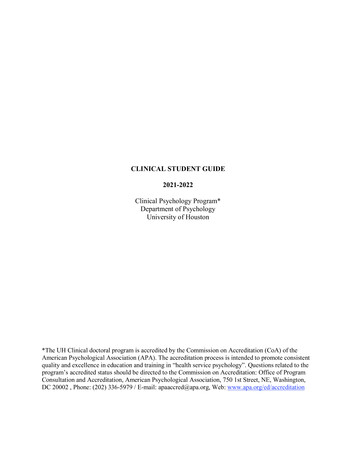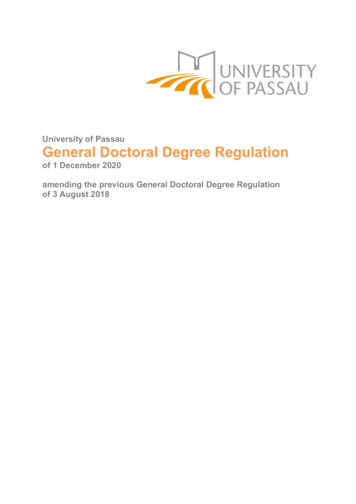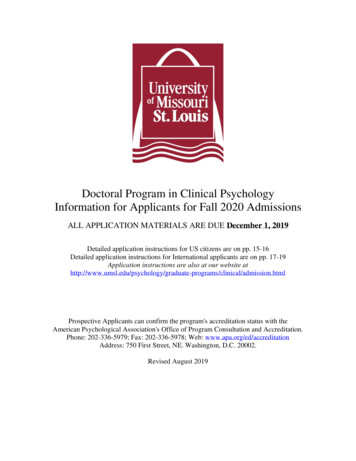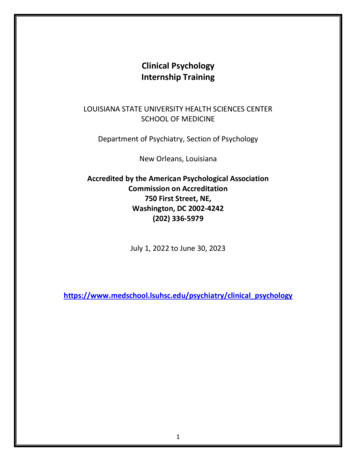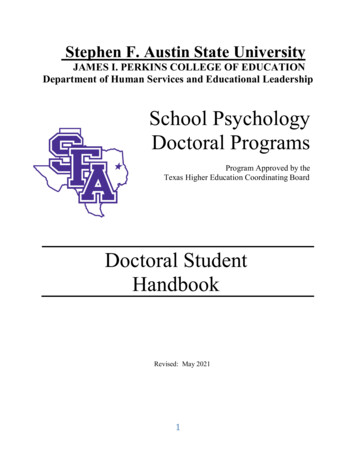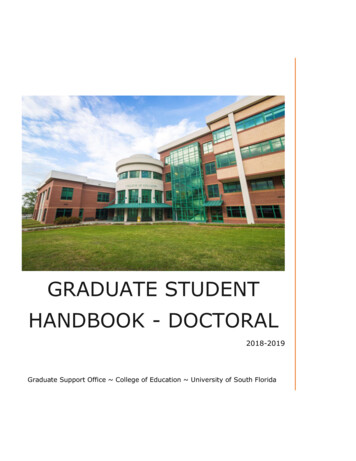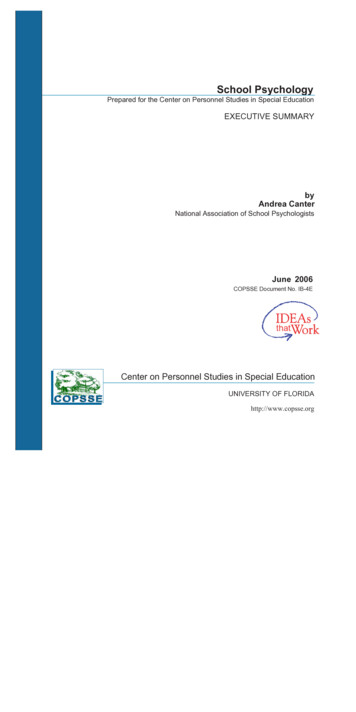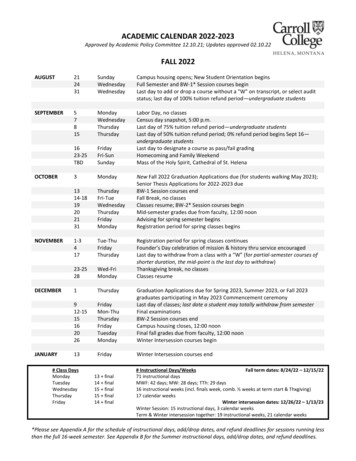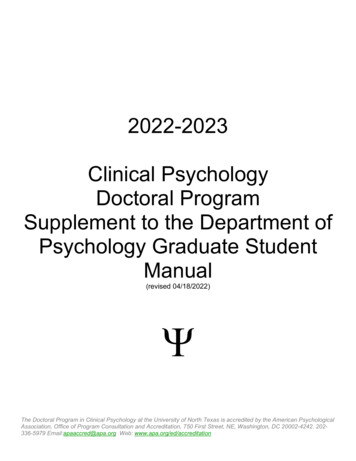
Transcription
2022-2023Clinical PsychologyDoctoral ProgramSupplement to the Department ofPsychology Graduate StudentManual(revised 04/18/2022)ΨThe Doctoral Program in Clinical Psychology at the University of North Texas is accredited by the American PsychologicalAssociation, Office of Program Consultation and Accreditation, 750 First Street, NE, Washington, DC 20002-4242. 202336-5979 Email:apaaccred@apa.org Web: www.apa.org/ed/accreditation
DOCTORAL PROGRAM IN CLINICAL PSYCHOLOGYUNIVERSITY OF NORTH TEXASI.Mission and Aims . 3II.Graduate Application and Admission. 3III.Admission to Graduate School . 4IV.Doctor of Philosophy Degree Requirements . 4V.Advisors Committees, and Consultation . 22VI.Professional Requirements . 22VII.Student Evaluations . 24VIII.Student Representation . 27IX.Policies, Procedures, and Appeals . neral Core Requirements . 5Clinical Core Requirements. 5Elective Forensic Experience . 7Elective Clinical Neuropsychology Experience . . .8Practicum Training .9External Practicum Training . 11Records . 13Research Training . 14Master of Science Degree . 19Qualifying Examination. 19Clinical Internship . 21Course Load Requirements . 21Graduate Degree Plans. 22Degree Plan Changes . 22Academic Requirements . 22Insufficient Progress . 24Misconduct . 24Annual Review . 24Comprehensive Nature of Evaluation 25Grievances . 28Grievance Procedure . 28Americans with Disabilities . 29Statement on Licensure . 30Appendix A . . 31Appendix B . . 39Appendix C . 41Appendix D . 42Appendix E . 43Appendix F . 45Appendix G . 46Appendix H . 522The Doctoral Program in Clinical Psychology at the University of North Texas is accredited by the American PsychologicalAssociation, Office of Program Consultation and Accreditation, 750 First Street, NE, Washington, DC 20002-4242. 202336-5979 Email:apaaccred@apa.org Web: www.apa.org/ed/accreditation
I. MISSION AND AIMSThe UNT Clinical Psychology Doctoral Program's mission is to provide evidence-based training thatprepares graduates to join the diverse health service psychology workforce as highly competent, ethical,and productive contributors to the science and practice of clinical psychology. The following four aimspromote that mission: Aim #1: Knowledge Acquisition. Two outcomes are associated with this aim: (a) acquisition ofdiscipline specific knowledge, and (b) acquisition of depth knowledge in clinical psychology.Aim #2: Professionalism. Students are expected to demonstrate the standing, practice, andmethods of an emerging health service psychologist.Aim #3: Clinical Skills. Students demonstrate emerging competence in evidence-based practice ofpsychology.Aim #4: Research Skills. Two outcomes are associated with this aim: (a) conduct of research atthe investigator level, and (b) demonstrable ability to disseminate and defend findings.The aims of our program are consistent with the definition of health service psychology as “theintegration of psychological science and practice in order to facilitate human development andfunctioning” (Standards of Accreditation, 2015, p. 1).Our program is designed to develop knowledge, skills, and professional competencies to enable ourgraduates to contribute to and advanced the evidence-base of the field across a wide range ofpractice and/or scientific settings. Our integrative training approach is consistent with a scientistpractitioner and PhD model. Upon conferral of the doctoral degree, our students are well prepared toidentify as Clinical Psychologists.Consistent with the APA description of Clinical Psychology as a ze/clinical), our program ensures our graduates are able toapply the theoretical knowledge germane to the specialty, address behavioral and mental healthissues, and competently apply procedures associated with the specialty of Clinical Psychology (e.g.,assessment, intervention, consultation, and research).Our program’s training model is sequential, cumulative, increasingly complex, and designed toprepare students for both clinical research and professional practice. It is intended to prepare ourstudents for careers in academic, research, or practice settings.II. GRADUATE APPLICATION AND ADMISSIONAdmission into the program is on a competitive basis. All applicants must submit 3 professionalreference letters. The minimum requirements in order to be considered for admission are that thestudent must:1.2.3.4.Completed the department’s prerequisite semester hours in Psychology (includingstatistics).Compose and submit a brief statement of personal background and professional goals.Submit a personal resume.Submit GRE scores (Verbal and Quantitative sections mandatory)3The Doctoral Program in Clinical Psychology at the University of North Texas is accredited by the American PsychologicalAssociation, Office of Program Consultation and Accreditation, 750 First Street, NE, Washington, DC 20002-4242. 202336-5979 Email:apaaccred@apa.org Web: www.apa.org/ed/accreditation
5.Meet at least one (1) of the following six (6) criteria:a.3.0 overall on the BAb.3.5 on the last 60 hours of the BAc.3.5 in undergraduate Psychology courseworkd.3.5 on a completed Master’s Degree (exclusive of practicum and thesis)e.Completed Doctoral Degree in another fieldf.First or second author on an article in a peer-reviewed scientific or professionaljournalAdmission to the Clinical Program at the University of North Texas is not based on any single criterionor sum of quantitative measures of achievement. Motivation, aptitude, and self-awareness are highlyvalued, as are skills in communication, research methods, and scientific writing. Life experiencesrelevant to research, human services, and cultural diversity are also valued and should be describedin the background and goals statement. Financial aid is available to most students during theirdoctoral studies.III. ADMISSION TO THE GRADUATE SCHOOLIn addition to departmental admission, each student must be admitted to the Graduate School. Thatis, separate admission must be made to the Dean of the Graduate School. Note that the studentmeeting standards for the Department also will meet standards for the Graduate School.IV. DOCTOR OF PHILOSOPHY DEGREE REQUIREMENTSThe Ph.D. degree in Clinical Psychology requires a minimum of 90 semester hours beyond thebachelor's degree and a one-year supervised clinical internship. This semester hour requirementdoes not include six hours of master's thesis credit but does include 9-12 hours for dissertation and 16 hours for internship. The qualified and accepted student may enter the doctoral program holdingeither a bachelor's or master's degree. All students must file all degree plans (Master's, if applicable,and Ph.D.) in their first semester; refer to the Psychology Department Graduate Student Manual forsamples of these plans.Students who are admitted to a doctoral degree program in the Psychology Department sometimeshave prior graduate coursework that would meet doctoral requirements. Coursework is evaluated inthe Psychology Department (for General Core Requirements) or by the Clinical Program (for ClinicalCore Requirements) to determine equivalency to doctoral course requirements. If the coursework issufficient to meet doctoral program requirements the doctoral course requirement may be waived.Requirements met by prior coursework do not appear on the doctoral degree plan, reducing thenumber of required hours for the doctoral degree. A maximum of 30 credits can be met by priorcoursework; no more than 12 of those credits may be used to meet the Clinical Core Requirements.For doctoral programs of 90 credit hours or more, the psychology doctoral degree plans require aminimum of 60 credits taken within the UNT system (or more per program requirements). Should astudent wish to waive any course requirements, requests must be submitted for approval to theDirector of Clinical Training using the form available on the department’s Graduate Coordinator’sVirtual Office webpage (with syllabi attached to each form).By keeping program-required credit hours minimal for degree attainment, clinical students are free toenhance their training by taking a variety of available elective courses, practica, and research4The Doctoral Program in Clinical Psychology at the University of North Texas is accredited by the American PsychologicalAssociation, Office of Program Consultation and Accreditation, 750 First Street, NE, Washington, DC 20002-4242. 202336-5979 Email:apaaccred@apa.org Web: www.apa.org/ed/accreditation
opportunities. Students often choose to take more electives than would be needed to meet minimumrequirements. The minimum hours (excluding credit hours associated with practica, thesis,dissertation, and internship) that are required above the bachelor's degree are divided as follows:A.GENERAL CORE REQUIREMENTSPsyc 5090Psyc 5640Psyc 5700Psyc 5710Psyc 6030B.HoursSocial PsychologyCognitive and Affective Bases of BehaviorQuantitative Methods IQuantitative Methods IIBiological Bases of BehaviorCLINICAL CORE REQUIREMENTS3333315HoursPsyc 5420 Assessment I3Psyc 5430 Assessment II3Psyc 6480 Ethics in Clinical Psychology*3Psyc 5780 Psychopathology3Psyc 6000 Introduction to Psychotherapy3Psyc 6300 Theory & Application of Multicultural Counseling3Psyc XXXX An advanced psychotherapy courseapproved by the Program** 3Psyc 6XXX An advanced assessment course***3 or 424 or 25*Practice-based ethics is a vital component of clinical training. Clinical students are required to complete an ethics coursewith an intensive experiential format, which trains them to apply ethical standards and professional practices to addresscompetently ethical dilemmas and quandaries. Experiential methods include role-playing, perspective-taking, and selfawareness (e.g., methods structured to reveal potential biases and vulnerabilities). At present, this program requirementis satisfied by PSYC 6480 Ethics in Clinical Psychology. The Clinical Program Committee evaluates other courses thatcould potentially meet this requirement on a course-by-course basis.**Currently, courses approved to meet this requirement are PSYC 6630 Series on Psychotherapy Theory, Research, andPractice; PSYC 6060 Group Psychotherapy; PSYC 5590 Diverse Family Systems; and PSYC 6410 Psychopathology andTreatment of Adolescents and Young Adults. If other Psychology Department courses are thought to meet thisrequirement, the instructor or a student may request that the Clinical Program approve that particular course for meetingthis requirement.*** Currently, courses approved to meet this requirement are PSYC 6420 Neuropsychological Assessment; PSYC 6450Psychodiagnostic Assessment; and PSYC 6460 Structured Interviews and Advanced Assessment Methods. Studentsmay petition approval of other courses on an individual basis) This course may be taken prior to OR AFTER the student completes the qualifying examination. All other Clinical Corecourses must be completed as a prerequisite to taking the qualifying examination.The clinical core requirements are designed to provide advanced training in assessment andtreatment. In addition, students are required to take two additional courses that are central to theirdevelopment as professional psychologists (an ethics course and one on multicultural issues).5The Doctoral Program in Clinical Psychology at the University of North Texas is accredited by the American PsychologicalAssociation, Office of Program Consultation and Accreditation, 750 First Street, NE, Washington, DC 20002-4242. 202336-5979 Email:apaaccred@apa.org Web: www.apa.org/ed/accreditation
Consistent with the program's respect for individuality, students become sensitized to issues ofmulticultural diversity through this course as well as through their clinical practica.Students must also take a course in Human Development (PSYC 5010) though the timing of thiscourse is not specifically sequenced as part of the core offerings by the program (the course is taughtby a developmental psychologist from the Behavioral Sciences program in the larger Department ofPsychology).Finally, all students must demonstrate domain specific knowledge (DSK) associated with History andSystems in Psychology. Consistent with the current Implementing Regulations for the Standards ofAccreditation for Health Service Psychology, the requirement for Discipline-Specific Knowledge(DSK) in History and Systems in Psychology is “the only portion of the DSK that may beaccomplished entirely prior to matriculation into the doctoral program and/or through undergraduatelevel work after matriculation into the doctoral program” (implementing regulation C-7 D). Studentswho completed an evaluated educational experience that sufficiently addressed DSKin History and Systems of Psychology prior to matriculation, at the graduate or undergraduate level,should provide a copy of the syllabus and evidence of a grade of B or higher for review to meet theDSK requirement in History and Systems.Students who enter the program without already fulfilling the History and Systems in Psychology DSKrequirement have two options available to them:(1) Enroll in an undergraduate or graduate-level course, at UNT or elsewhere. Upon conclusion,provide a copy of the syllabus and evidence of the final grade (at the level of B or higher).(2) Enroll in PSYC 5900 (Special Problems) under the section associated with the Director ofClinical Training to engage in self-directed, unstructured, and independent learning of DSKpertaining to History and Systems in Psychology. Recommended readings and resources forDSK acquisition are provided in Appendix F. Students who have selected this option will beassessed for their DSK acquisition in this area via a multiple-choice format test at theconclusion of the semester in which they have enrolled. A score of 80% or higher is necessaryto demonstrate DSK (consistent with scores that achieve a B or better in courses).The sequence for individual students is determined by the student in consultation with his/her/theirClinical Program advisor. Students’ knowledge and competencies are assessed by evaluations ofstudent performance by course instructors (class discussions, exams and written assignments), finalgrades, annual student evaluations, practicum evaluations, and defenses of the thesis anddissertation proposals and final documents.The department and graduate school both require continuous enrollment. Failure to remaincontinuously enrolled during long semesters will result in being removed from the program.The doctoral program in Clinical Psychology requires of each student a minimum of 3 full-timeacademic years of graduate study plus completion of an internship prior to awarding the doctoraldegree. At least 2 of the 3 academic training years must be at UNT.C.ELECTIVE FORENSIC EXPERIENCEThe Elective Experience in Forensic Training is designed to provide doctoral students in clinicalpsychology with an additional credential and specialized training in forensic psychology. Competitive6The Doctoral Program in Clinical Psychology at the University of North Texas is accredited by the American PsychologicalAssociation, Office of Program Consultation and Accreditation, 750 First Street, NE, Washington, DC 20002-4242. 202336-5979 Email:apaaccred@apa.org Web: www.apa.org/ed/accreditation
internships often value prospective interns with additional training involving specialized assessmentswhether or not they include a forensic rotation.BackgroundThe forensic elective draws on the expertise of the clinical faculty. Research by Dr. Rogers has beennationally recognized for its contributions to Miranda, competency to stand trial, and malingering. Inaddition, expertise in clinical forensic training is provided by Dr. Rogers, board-certified (ABPP) inforensic psychology, Dr. Callahan, board-certified (ABPP) in clinical psychology, and Dr. Parsons,who offers specialization in forensic applications to neuropsychology.The American Psychology-Law Society (APLS), in acknowledging UNT's contributions to the trainingin forensic psychology, invited UNT to be listed as a clinical doctoral program with specializedforensic training.ScopeIn keeping with the scientist-practitioner model, clinical students choosing this elective experience willhave training in both forensic practice and research. It is conceptualized in two phases.Phase 11 is conceptualized as coursework and research practicum with a forensic focus. It should becompleted in the first three years. Because of course patterning (e.g., electives on alternatingyears), clinical students must plan to take these courses as soon as it is feasible. 1Required:PSYC 6460: Diagnostic and Structured InterviewingPSYC 6520: Forensic Psychology: Theory and PracticeRecommended:PSYC 6900/6910: Special Problems: Research Practicum with a forensic emphasis (2semesters) 2PSYC 6835: External Research PracticumPhase 2The primary focus during Phase 2 is the completion of two semesters at a forensic externshipsite approved by the Clinical Faculty Committee. Forensic externships will be informed by theprogram’s External Practicum Coordinator about which clinical students applying to their siteshave completed Forensic Training Phase 1.Required:PSYC 6820/6830: Practicum (external clinical section of the course offering)Courses 6460 and 6520 cannot be taken in the first year.Although typically in a forensic or correctional setting, clinical settings can be used if the research has direct bearing onforensic practice (e.g., malingering).127The Doctoral Program in Clinical Psychology at the University of North Texas is accredited by the American PsychologicalAssociation, Office of Program Consultation and Accreditation, 750 First Street, NE, Washington, DC 20002-4242. 202336-5979 Email:apaaccred@apa.org Web: www.apa.org/ed/accreditation
As Phase 2, clinical students will be encouraged to complete their theses and/or dissertationson forensic topics.CredentialsClinical students completing both phases of the Elective Experience in Forensic Training will receivea certificate. Letters from the Director of Clinical Training to internships will also affirm this additionallevel of training.D.ELECTIVE CLINICAL NEUROPSYCHOLOGY EXPERIENCEThe Elective Experience in Clinical Neuropsychology Training is designed to provide doctoralstudents in clinical psychology with documentation of specialized training in clinical neuropsychology.Competitive internships often value prospective interns with additional training that is consistent withthe Houston Conference on Specialty Education and Training in Clinical Neuropsychology guidelines.BackgroundClinical neuropsychology is a specialization within clinical psychology that is recognized by theAmerican Psychological Association (as well as internationally). Leadership of Division 40 of APA, theNational Academy of Neuropsychology (NAN), the American Academy of Clinical Neuropsychology(AACN) and the Association of Postdoctoral Programs in Clinical Neuropsychology (APPCN) havedescribed integrated education and training in the specialty of clinical neuropsychology that is bothprogrammatic and competency-based. Integration is expected to begin with doctoral education from ascientist-practitioner model, leading to a combined, primarily practice, or primarily academic career.ScopeIn keeping with the scientist-practitioner model, clinical students choosing this elective experience willhave training that builds both the necessary knowledge base as well as skills.Knowledge BaseIn addition to the departmental core and the clinical core courses, clinical neuropsychologynecessitates knowledge of foundations for the study of brain-behavior relationships andfoundations for the practice of clinical neuropsychology. This core knowledge may be acquiredthrough multiple pathways, not limited to courses, and may come through other documentabledidactic methods. The following courses are required of students wishing to complete theclinical neuropsychology experience, but students must acquire additional didacticopportunities during their doctoral, internship, and post-doctoral training before meeting theminimum necessary requirements as detailed by the Houston conference guidelines.PSYC 6650: PsychoneuroimmunologyPSYC 6420: Neuropsychological AssessmentSkillsTo foster skills, students completing this experience will be encouraged to complete theirtheses and/or dissertations on clinical neuropsychology topics. In addition, the following8The Doctoral Program in Clinical Psychology at the University of North Texas is accredited by the American PsychologicalAssociation, Office of Program Consultation and Accreditation, 750 First Street, NE, Washington, DC 20002-4242. 202336-5979 Email:apaaccred@apa.org Web: www.apa.org/ed/accreditation
research training is required:PSYC 6835: Research Practicum (2 semesters; with a clinical neuropsychology emphasis)With respect to clinical practicum, students must complete two semesters at a clinicalneuropsychology externship site approved by the Clinical Program Committee.Students selecting to complete the Elective Clinical Neuropsychology Experience are advisedthat the Houston conference guidelines specifically require that internship must be completedin an APA or CPA approved professional psychology training program.CredentialsClinical students completing the requirements of the Elective Experience in Clinical NeuropsychologyTraining will receive a certificate. Letters from the Director of Clinical Training to internships will alsoaffirm this additional level of training.E.PRACTICUM TRAININGPrepracticum and practicum experience in Clinical Psychology begins in the first semester andcontinues for a minimum of three years to ensure that training is sequential, cumulative, andincreasing in complexity. The practicum training begins with more closely supervised experiences inour department’s Psychology Clinic and progresses to external placements where students havegreater autonomy and opportunity to develop more advanced levels of competency under thesupervision of experienced licensed psychologists.In the Psychology Clinic, the development of clinical skills occurs through the student's participationeach year on a vertical practicum team consisting of students from three levels of training(prepracticum, assessment practicum and psychotherapy practicum). Each vertical team is acohesive, hardworking unit of about six to eight members under the supervision of a licensed healthservice psychologist. An academic year's service on the practicum team, at each level, offers afocused practical experience informed by the theoretical orientation of the supervising psychologist.Care in the annual assignment of students to different practicum teams (accomplished by the Directorof Clinical Training) provides students with exposure to a breadth of supervisory orientations. Eachpracticum supervisor utilizes empirically-based readings, didactic experiences, and case consultationfrom her/his/their theoretical approach to the professional practice of psychology. Weekly practicumteam meetings permit the opportunity for case rounds and in-depth presentations and theconsideration of assessment and treatment issues. Team meetings typically involve thedemonstration of clinical methods, the use of empirically-based evidence to inform practice, and theconsideration of individual differences and cultural issues as they apply to individual cases. Finally,discussions often include (a) supervision theory and processes, (b) ethical standards, and (c)professional roles and responsibilities.PrepracticumIn conjunction with the Assessment I and II sequence during the first year of study, students have apracticum team responsibility of approximately 10 hours per week. They acquire basic skills withrespect to objective and projective assessment methodologies, diagnostic interviewing, systematic9The Doctoral Program in Clinical Psychology at the University of North Texas is accredited by the American PsychologicalAssociation, Office of Program Consultation and Accreditation, 750 First Street, NE, Washington, DC 20002-4242. 202336-5979 Email:apaaccred@apa.org Web: www.apa.org/ed/accreditation
behavioral observation, and relationship formation. Other professional responsibilities include recordkeeping, appointments, adherence to UNT Psychology Clinic policies and procedures, casemanagement problems, ethical issues, and professional demeanor. First year students also receive apreliminary introduction to advanced clinical methods. Their roles on the practicum team includeobservation of and supervised involvement in the practicum activities of advanced team membersand the supervising psychologist, as well as participation in weekly team meetings. In addition, allfirst-year clinical program students (across teams) meet weekly for a proseminar with readings anddiscussion drawn primarily from the American Psychological Association’s (APA) Recovery toPractice Curriculum as well as the Society for Health Psychology’s Integrated Primary CarePsychology Curriculum. During prepracticum, students are expected to meet the minimumquantitative requirements described below in order to fulfill their responsibility to their practicum team.1.Log at least 50 hours of case observation and assessment.2.Log at least 25 hours of individual supervision from advanced team members andsupervising psychologist.3.Log at least 30 hours of group supervision from weekly team meetings.Assessment PracticumDuring the second year of study (or its equivalent), clinical students have a practicum teamresponsibility of approximately 12-15 hours each week. This experience occurs following courses inassessment and psychopathology and in conjunction with core courses in ethics and psychotherapy.Second year students are expected to acquire assessment skills responsive to referral questions,while also achieving the integration of assessment, conceptual-interpretive, and expressive (oral andwritten) skills. Second year students also are introduced to therapy approaches through observationof advanced-level team members. Their role on the team includes provision of clinical evaluationservices (assessments, psychological reports, consultations to referral sources). In addition, theysupervise less advanced team members, develop skills in psychotherapy, and participate in weeklyteam meetings. During the assessment practicum (usually encompassing two semesters), studentsmust meet the minimum quantitative requirements described below in order to fulfill theirresponsibility to their practicum team.1.Log at least 90 hours of Assessment (minimum of 10 full batteries) and therapyservices.2.Log at least 25 hours of supervision provided to less advanced team members.3.Log at least 30 hours of individual supervision from advanced team members andsupervising psychologist.4.Log at least 30 hours of group supervision from weekly team meetings.Psychotherapy PracticumFollowing the assessment practicum, clinical students are involved in psychotherapy andconsultation. Usually during the third year of study, these students assume a senior position on thevertical team and have a practicum team responsibility of about 20 hours per week. This experienceoccurs in conjunction with advanced coursework and clinical electives. The goals of the third-yearstudent are to develop treatment skills for short-term interventions and psychotherapy. Their roles onthe team include clinical treatment services, psychological evaluation services of a highly specializednature, and consultation services to adjunct resources and comm
The Doctoral Program in Clinical Psychology at the University of North Texas is accredited by the American Psychological Association, Office of Program Consultation and Accreditation, 750 First Street, NE, Washington, DC 20002-4242. 202- . The UNT Clinical Psychology Doctoral Program's mission is to provide evidencebased training that -


